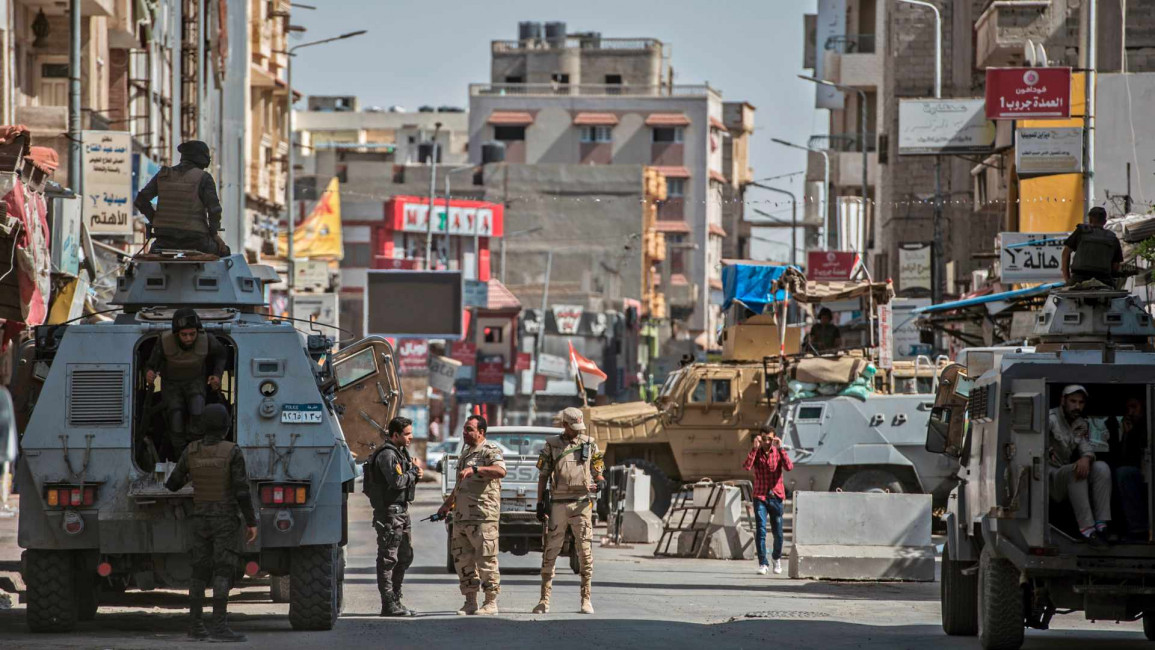Families of Sinai conflict victims say the government government cut pay-outs after coronavirus outbreak
Families of Sinai conflict victims say the government government cut pay-outs after coronavirus outbreak
Egyptian authorities have reduced pay-outs to families of victims without explanation.
2 min read
The civilian death toll is unknown [AFP]
Families of Egyptians killed in the crossfire in the North Sinai have complained that their state benefits have been cut amid the coronavirus crisis that threatens to further cripple Egypt's battered economy.
Authorities tasked with providing the special salaries to local residents have not explained why the benefits have been cut.
The Egyptian military has been battling an insurgency in the Sinai peninsula for nearly a decade but local militants intensified their attacks after President Abdel Fattah al-Sisi's rise to power in a 2013 coup.
Since then, Sisi's military has been accused by rights groups of widespread abuses and war crimes against civilians in the long-marginalised region.
A near-total media blackout means the Egyptian government rarely acknowledges civilian deaths.
"Accidental" injuries and deaths acknowledged by the media are liable for payments from the authorities, locals told The New Arab's Arabic-language sister site.
Favourable connections with the authorities play a large part in who receives such handouts, so many families in the especially marginalised areas of Rafah, Sheikh Zuwayid and the outskirts of Al-Arish go without.
Hundreds of people are thought to receive such pay-outs, according to local sources.
The total number of civilian lives claimed by the conflict is unknown, but unofficial sources state that thousands have been killed or injured over the course of the insurgency.
Rights groups have accused the Egyptian military of attacking civilians mistaken for militants, as well as inflating militant death tolls to include those of civilians.
The military has reported far more militant casualties than the estimated number of fighters in the area.
Follow us on Facebook, Twitter and Instagram to stay connected
Authorities tasked with providing the special salaries to local residents have not explained why the benefits have been cut.
The Egyptian military has been battling an insurgency in the Sinai peninsula for nearly a decade but local militants intensified their attacks after President Abdel Fattah al-Sisi's rise to power in a 2013 coup.
Since then, Sisi's military has been accused by rights groups of widespread abuses and war crimes against civilians in the long-marginalised region.
A near-total media blackout means the Egyptian government rarely acknowledges civilian deaths.
"Accidental" injuries and deaths acknowledged by the media are liable for payments from the authorities, locals told The New Arab's Arabic-language sister site.
Favourable connections with the authorities play a large part in who receives such handouts, so many families in the especially marginalised areas of Rafah, Sheikh Zuwayid and the outskirts of Al-Arish go without.
Hundreds of people are thought to receive such pay-outs, according to local sources.
The total number of civilian lives claimed by the conflict is unknown, but unofficial sources state that thousands have been killed or injured over the course of the insurgency.
Rights groups have accused the Egyptian military of attacking civilians mistaken for militants, as well as inflating militant death tolls to include those of civilians.
The military has reported far more militant casualties than the estimated number of fighters in the area.
Follow us on Facebook, Twitter and Instagram to stay connected


![President Pezeshkian has denounced Israel's attacks on Lebanon [Getty]](/sites/default/files/styles/image_684x385/public/2173482924.jpeg?h=a5f2f23a&itok=q3evVtko)



 Follow the Middle East's top stories in English at The New Arab on Google News
Follow the Middle East's top stories in English at The New Arab on Google News


